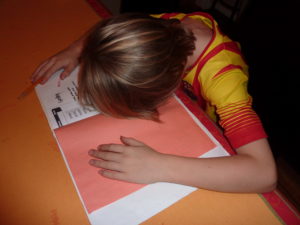For the last few weeks I have written about three of the goals of misbehaviour, according to Dr. Rudolph Dreikurs (Dreikurs, R. (1947). The four goals of the maladjusted child. Nervous Child, 6, 321-328.)
Today I am writing about the most difficult one, the fourth and final goal of misbehaviour: Assumed Inadequacy and Avoidance.
All children are born feeling encouraged but for some reason, life sometimes takes its toll, and for a child to reach this stage they are feeling very discouraged. As always, it is important as parents not to beat yourselves up. We are all doing the best we can with the knowledge we have.
Some children are born with much more challenging temperaments than others, thus comparing children is like comparing apples to oranges.
When a child becomes so discouraged that they appear to have given up, this is extremely discouraging for the parents too, and often the parents also feel like giving up. However, there are things you can do. I highly recommend reading Honey I Wrecked the Kids by Alyson Schafer (don’t take the title personally, she’s a light-hearted author with excellent advice) and/or seeking the support and guidance of a Child and Family Counsellor whose theoretical approach resonates with you.
The Avoidant Child
These children have experienced a lot of failure in their lives.
They don’t feel significant and a sense of belonging, thus they’d rather curl up into a ball and be left alone.
To protect themselves from further disappointment, they would rather give up and not try anymore. They try to convince others to expect nothing from them and to let them be helpless.
The parents often feel despair, hopeless, helpless and inadequate. The parents may over-compensate by over-helping the child.
These children have such a fear of failure that they’ve lost their courage. They often give up with their school work, avoid activities, and perceive themselves as being the lowest rung on the ladder of achievement.
The Antidote to Despair: Encouragement, Mastery and Connection
Encouragement and Mastery
Encouragement is different from praise. It is non-judgmental and recognizes effort. It is respectful and appreciative.
To be an encourager:
- avoid discouragement, praise and punishment (read more on this in last week’s article “I hate you” Ouch! How to Handle These Episodes)
- focus on effort and improvement vs. perfection and results
- separate the behaviour from the child (read more on this from the article Attention Seeking Behaviour) and remind children that they have choices in how they behave
- focus on the strengths and that is what you will reinforce – focus on the weaknesses and that is what you will reinforce
- show your trust
- view mistakes as an opportunity for growth – none of us is perfect and we all make mistakes, that is the journey of life
- encourage and lead but don’t pressure
- teach your child the skills toward increased self-sufficiency
- competition is a set-up for someone to fail – focus on contribution and cooperation instead
- model how to take mistakes in stride and don’t talk to yourself in a disparaging way – your child will pick up on this
- analyze your language – are you a praiser or an encourager (for more information read encouragment vs. praise)
- choose to model and believe in optimism
- give responsibility to the discouraged child in order that he/she can feel significant vs. giving all the responsibility and significance to the capable child
- focus on baby steps toward success and mastery with the discouraged child
- accept each child for who they are, knowing that we all come into this world with our own unique code of temperament
Connection and the Gift of Time
- increase the amount of 1:1 parent-child unstructured/play quality time
- give massages, foot rubs, rough and tumble play (if your child likes this), pillow fights (again if your child likes this)
- go on an outing into a new environment where your child feels more dependent on you to increase the attachment (eg. camping, visit a foreign country, amusement park rides – not to recommend a big roller-coaster ride unless you and your child love these, but any ride that your child wants you to go on with him/her)
- bed-time rituals – spend lots of time together reading stories, cuddling, talking – a lot comes out at bed-time – just start the routine early enough that you build in time for heart-heart talks that might come up
- listen and watch more, talk/text less
- ask them about themselves, discuss their dreams/nightmares
- surprise them with an outing or send them a letter or a postcard
- look at baby photos together
- display their artwork in your home
- get down to their level – kneel, squat, sit, play on the floor with them
- welcome their suggestions, try to make their ideas work
- tell them how much you enjoy being with them
- build something together
- foster their creativity
- play ball together (soccer, catch, throw a baseball to each other and practice with a mitt)
- play a board game together
Want to Connect?
Subscribe now to receive free weekly parenting tips and inspiration.









One thought on “The Fourth Goal of Misbehaviour: Assumed Inadequacy & Avoidance”
Comments are closed.